
More hospitals and healthcare facilities are turning to locum tenens providers to fill gaps in coverage than ever before. But how do you choose who to work with if you’ve never worked with a locum tenens company before?
We talked with two expert physician recruiters about how they choose which locum tenens companies to work with as staffing partners, and their advice is eye-opening: Not all locum tenens agencies are created equal, and if you don’t know what to look for, you could be signing up for a bad locums experience.
Building a trusting, transparent relationship with a well-vetted locum tenens staffing company gives you a better chance of bringing in quality providers. Here are the experts’ top six tips for building a partnership that will give you the best results.
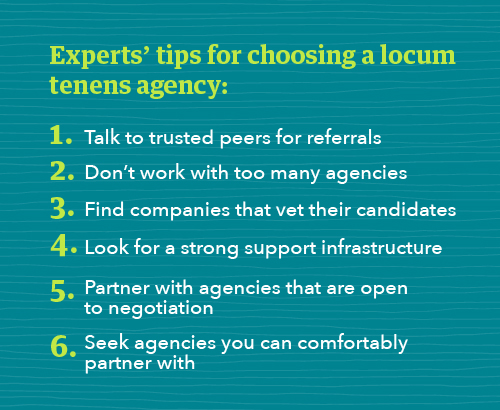
1. Reach out to peers for referrals
If you are new to a recruiting position, you may not know which locum tenens agencies are best able to meet your facility’s needs. Asking recruiting peers in your network which agencies they use is a great way to start off on the right foot.
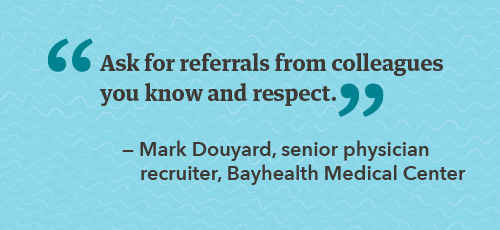
“If I had to start from scratch, I’d ask for referrals from colleagues that I knew and respected,” says Mark Douyard, senior physician recruiter at Bayhealth Medical Center.
Douyard recommends reaching out to colleagues in the AAPPR network or other physician recruiter groups. “Put up a post saying, ‘Hey, I’m looking for a locums ENT doc. Who’s got a recommendation?’ You start by working with recommendations that you get from your peers.”
2. Don’t work with too many agencies
The best locum tenens agencies should help you streamline your work, not make it worse. That’s why experienced recruiters usually select only a few key agencies to work with.
There’s no magic number of how many is best, says Steven Jacobs, manager of physician recruitment at Einstein Healthcare Network and President of the Mid-Atlantic Physician Recruiter Alliance (MAPRA). Rather, it’s figuring out how many companies you can reasonably manage.
“How many companies can you talk to in a given day? How many people do you want to have in play? For young recruiters, I think less is more in the beginning until you're in a place where you feel like you can spin a few more plates,” says Jacobs.
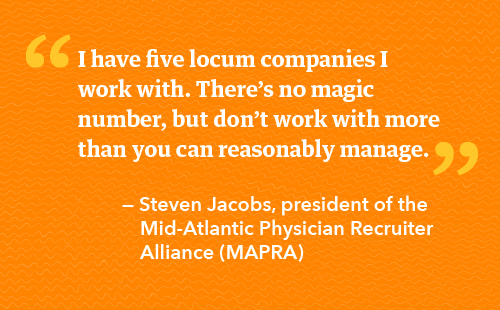
“I have five companies that I work with for locums. If I'm looking for someone in fetal medicine, all five of them are getting it because there are not that many out there, and I need somebody to stumble upon one. But if I’m looking for a GI, maybe I just need two companies to look for that because the pool’s a lot bigger,” he says.
3. Find locum tenens companies that vet their candidates
A good locums agency should do their due diligence by vetting candidates before you ever receive a CV, but it can be tricky to figure out which ones do this well.
“Quality is important, but quality control is atrocious in the industry,” says Jacobs. “There are no built-in reviews or quantifiable pieces of data you can use to understand whether a locum is fantastic or not.”
Many recruiters say they end up doing much of the quality control themselves when choosing which provider to hire. “References from prior assignments are very important, and companies don’t always provide those,” says Douyard. “I would suggest to anybody that if you’re going to hire a locums doc, talk to whoever that doctor reported to at one or two of their previous assignments.”
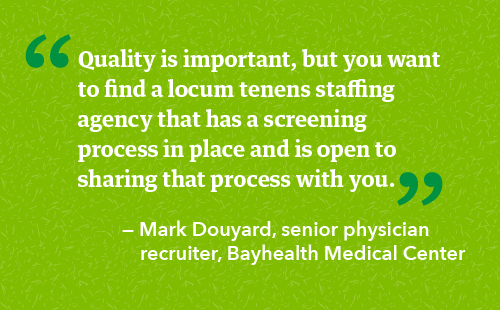
Douyard says that smart locum tenens staffing companies will have a screening process in place and be open to sharing that process with you if you ask more about it. This should help weed out providers who aren’t eligible or available for your position and will save you time, too.
4. Look for a strong support infrastructure
Any locum tenens recruiter you decide to work with should assist its providers with credentialing and licensing, says Douyard.
“You want to find out what kind of credentialing and licensing assistance they have because if you leave it up to the doctor to do that stuff, it’s not going to get done on a timely basis,” Douyard says. He adds that recruiters should always find out what kind of support the locums agency offers its providers and what kind of infrastructure the agency has to process these types of requests.
5. Negotiate your contracts
Jacobs emphasizes that contracts can be negotiated, and a good locums agency should be open to making changes so both sides are comfortable with the agreement.
“You may have to have several conversations with them, but most of the companies who want to do business with large organizations will come around,” he says. “I think what happens to most new recruiters is they’re just taken advantage of because they don’t know what they don’t know.”
He always asks any agency he works with for its rate sheet to establish a baseline and then begins negotiations from there. He’s also worked other items into agreements to ensure his locums fulfill certain obligations like charting.
6. Aim for partnership with the locum tenens companies
Both recruiters say that your end goal should be to find an agency that feels like a true partner. “Ours is a relationship business,” says Douyard. “I’ve got a handful of people that I trust, and these are the people that I can go to and I know that they're going to listen to me and get the job done.”
Douyard gives an example of a GI rep he works with at Weatherby Healthcare: “I know that he’s not going to send me a marginal candidate or a brand new one that they haven’t worked with before because those are the standards that we’ve set.”
Jacobs says that he’s also much more willing to work with a partner he trusts. “If I can find a good reputable company that can give me good reputable candidates, I'll work on the rest of it. I'll work on the price, travel, and expenses. We’ll negotiate that after the fact, as long as you can prove to me that you can do the job you’re hiring for,” he says.
Finding the right fit
When choosing locum tenens staffing agency, finding one that understands your organization’s values, culture, and needs can be challenging, but it’s not impossible. By asking the right questions, connecting with your colleagues, and negotiating for what you need, you’ll be able to find a locum tenens company that fits with your organization. A good partnership will save time and provide better quality locums, ultimately leading to better patient care.
Read more tips on choosing a locum agency
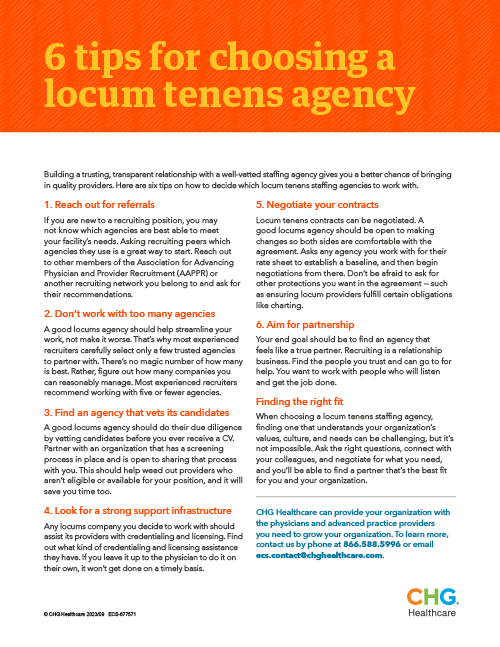
CHG is the leading locum tenens staffing agency in the U.S. We have the doctors, nurses, and allied professionals you need to provide the highest quality care for your community. Contact us by phone at 866.588.5996 or email at ecs.contact@chghealthcare.com.